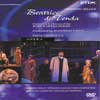Bellini Beatrice di Tenda
Remarkably fine singing graces this issue… shame about the remarkably poor staging
View record and artist detailsRecord and Artist Details
Composer or Director: Vincenzo Bellini
Genre:
DVD
Label: TDK
Magazine Review Date: 2/2004
Media Format: DVD-Audio
Media Runtime: 170
Mastering:
Stereo
Catalogue Number: DV-OPBDT

Tracks:
| Composition | Artist Credit |
|---|---|
| Beatrice di Tenda |
Vincenzo Bellini, Composer
Boguslaw Bidzinski, Rizzardo, Tenor Edita Gruberová, Beatrice, Soprano Marcello Viotti, Conductor Michael Volle, Filippo, Baritone Miroslav Christoff, Anichino, Tenor Raùl Hernández, Orombello, Tenor Stefania Kaluza, Agnese, Mezzo soprano Vincenzo Bellini, Composer Zurich Opera House Chorus Zurich Opera House Orchestra |
Author: John Steane
The note in the leaflet begins: ‘Today’s audience often find it difficult to comprehend what makes Vincenzo Bellini’s operas remarkable’. I’m sure the writer had no intention of inciting hollow laughter, but, oh my dear sir (one wants to cry), Bellini and his music are just about the least ‘difficulty’ a viewer of this truly dreadful production is likely to face. In fact, Bellini is the hero of the occasion as surely as Edita Gruberová is the heroine. His music is heard in excellent sound, and she, at only a week or so short of 55, sings with a fine art which makes full use of this astonishingly well preserved voice. The conductor Viotti works with her (as he puts it in a recorded talk, ‘like jazz’), and the other soloists are worthy of the occasion.
But the occasion itself is disgraced by its staging, which is a compendium of the modern producers’ foibles. It sets the Renaissance story in (at a guess) the 1920s (women in long evening dress, men in frock coats, wing collars and waistcoat suits); the designers suggest an Art Deco liner or hotel or villa (but more inescapably a mess); the stage revolves for no good reason, and the directors play with it like a toy; the chorus are miserably static, the principals semi-stylised in their movements. And so forth. Silly distractions abound, and when a strong producing hand is needed – to communicate the work’s dramatic power to the audience – there is no sign of it.
Perhaps it would be a pity to miss this entirely, for some of Gruberová’s singing (as in the aria ‘Deh! Se mi amasti un giorno’) is exquisite. Moreover, Stefania Kaluza’s warm-toned, sincerely acted Agnese and the looming Karloffian presence and full-bodied sonority of Michael Volle’s Filippo make a powerful impression. It would be different if I could whole-heartedly recommend one of the available sound-recordings, whether Sutherland’s or Gruberová’s own (both 2/93). As it is, I would almost suggest buying the DVD and binning it after one horrified viewing, after re-recording the soundtrack – but that, I believe, is against the law.
But the occasion itself is disgraced by its staging, which is a compendium of the modern producers’ foibles. It sets the Renaissance story in (at a guess) the 1920s (women in long evening dress, men in frock coats, wing collars and waistcoat suits); the designers suggest an Art Deco liner or hotel or villa (but more inescapably a mess); the stage revolves for no good reason, and the directors play with it like a toy; the chorus are miserably static, the principals semi-stylised in their movements. And so forth. Silly distractions abound, and when a strong producing hand is needed – to communicate the work’s dramatic power to the audience – there is no sign of it.
Perhaps it would be a pity to miss this entirely, for some of Gruberová’s singing (as in the aria ‘Deh! Se mi amasti un giorno’) is exquisite. Moreover, Stefania Kaluza’s warm-toned, sincerely acted Agnese and the looming Karloffian presence and full-bodied sonority of Michael Volle’s Filippo make a powerful impression. It would be different if I could whole-heartedly recommend one of the available sound-recordings, whether Sutherland’s or Gruberová’s own (both 2/93). As it is, I would almost suggest buying the DVD and binning it after one horrified viewing, after re-recording the soundtrack – but that, I believe, is against the law.
Discover the world's largest classical music catalogue with Presto Music.

Gramophone Digital Club
- Digital Edition
- Digital Archive
- Reviews Database
- Full website access
From £8.75 / month
Subscribe
Gramophone Full Club
- Print Edition
- Digital Edition
- Digital Archive
- Reviews Database
- Full website access
From £11.00 / month
Subscribe
If you are a library, university or other organisation that would be interested in an institutional subscription to Gramophone please click here for further information.




